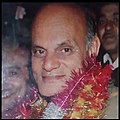Top Qs
Timeline
Chat
Perspective
Himachal Pradesh Legislative Assembly
Unicameral legislature of the Indian state of Himachal Pradesh From Wikipedia, the free encyclopedia
Remove ads
The Himachal Pradesh Legislative Assembly (Vidhan Sabha) is the unicameral legislature of the Indian state of Himachal Pradesh. The seat of the Assembly is at Shimla, the capital of the state. There are 68 Members of Legislative Assembly, all directly elected from single-seat constituencies.[4] Its term is 5 years, unless sooner dissolved.

Remove ads
History

Himachal Pradesh was the first state in India to launch a paperless legislative assembly.[5][6]
List of assemblies
Summarize
Perspective
Remove ads
Members of Legislative Assembly
Summarize
Perspective
Remove ads
List of speakers and deputy speakers
Summarize
Perspective
List of speakers
List of deputy speakers
Remove ads
List of Leaders of the House
Summarize
Perspective
The Chief Commissioner's Province of Himachal Pradesh was formed on 15 April 1948 through the integration of 30 erstwhile princely-states. In 1951, Himachal Pradejsh become a Part C state, under the Government of Part C State, 1951 and was brought under a lieutenant governor with 36-member Legislative Assembly. First elections to the Assembly were held in 1952.[10] The Indian National Congress won 24 seats to form a government under Yashwant Singh Parmar.
In 1954, Bilaspur, another part-C State, was merged with Himachal Pradesh. In 1956 it was made a Union Territory and was placed under a lieutenant governor with a Territorial Council with limited powers.[11]
In 1963, Himachal Pradesh though being a Union Territory was provided with a Legislative Assembly. The Territorial Council was converted into the Legislative Assembly of the Union Territory. The assembly has its first sitting on 1 October 1971.[10] On 18 December 1970, the State of Himachal Pradesh Act was passed by Parliament and the new state came into being on 25 January 1971. Thus Himachal Pradesh emerged as the 18th state of Indian Union.[12]
Remove ads
List of Leaders of Opposition
Remove ads
See also
Notes
- A number inside brackets indicates that the incumbent has previously held office.
- This column only names the chief minister's party. The state government he headed may have been a complex coalition of several parties and independents; these are not listed here.
- This column only names the chief minister's party. The state government he headed may have been a complex coalition of several parties and independents; these are not listed here.
- President's rule may be imposed when the "government in a state is not able to function as per the Constitution", which often happens because no party or coalition has a majority in the assembly. When President's rule is in force in a state, its council of ministers stands dissolved. The office of chief minister thus lies vacant, and the administration is taken over by the governor, who functions on behalf of the central government. At times, the legislative assembly also stands dissolved.[13]
Remove ads
References
Wikiwand - on
Seamless Wikipedia browsing. On steroids.
Remove ads













